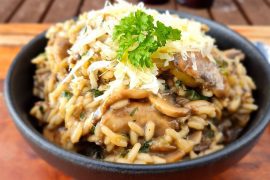We don’t need a big garden to grow our own food. Children are fascinated even to see some seeds sprout in a container on the windowsill or some flower pots on the balcony.
What has struck me most though throughout the years is the worrying tendency in our western world to lose the social importance of food. When I watch documentaries from many other, often poorer parts of the world, it always strikes me how food and eating together is the glue that binds families and communities together. Even though there mightn’t be an abundance of food available, people are brought together and mealtimes are the most important social event of the day. People meet up, sit around a table and share their news, discuss recent events or just enjoy each other’s company.
Through modern life circumstances this important social ritual is becoming more and more absent from daily family interactions and I believe this is causing a significant disruption in family relationships. Family is our first experience of social connection and communication, it’s our blueprint of how we will interact with others in the future. Even if it might not be possible to eat together as a family every day, it is important to make time for this precious opportunity to share food and experiences, to re-connect the family unit in whatever form that may be.
On another level, food memories and traditions are deeply ingrained into our human make-up:
THE MADELEINE EFFECT
Food is obviously a necessity for human survival, but it is so much more when we really think about it. Food is pleasure; food connects to family; food is tradition; food is connection to nature and the people who produce it. Food creates and evokes memories, connects people socially and is the key ingredient for celebration. Food expresses love and friendship. We all have our favourite meals and foods that have the ability to transport us straight into our childhood, to a memorable holiday, to a treasured memory of a celebration.
When I close my eyes I can instantly recall the delicious scent of our favourite Sunday dinner: roast chicken in a spice-and-herb marinade with home-made chips. Especially around Christmas time, the scents of cinnamon, star anise and oranges bring back precious memories of Advent in Germany and the bounty of delicious treats in our Christmas markets. I could list countless examples of my personal memories connected to certain tastes, smells and foods. There is actually a name for the effect food has on our minds and memories – it is called the “Madeleine Effect” after a passage in Marcel Proust’s 1913 novel, In Search of Lost Time, in which he describes the experience of the character, who every time after eating the sweet treats (madeleines) is overcome by a warm and comforting feeling and eventually remembers his aunt who had always given him these treats every time he visited her.
This effect has since been studied by many scientists, and it was discovered that it is actually our sense of smell, which goes hand in hand with our sense of taste, that is responsible for connecting food and emotional memories from the past. The reason for this most probably lies in the structure of our brains, as (in simple terms) our noses transport scents straight into the areas of our brain responsible for our emotions, namely the amygdala and the hippocampus. Also it is often found that olfactory memories go back further into our early childhood than many other memories, as we tend to connect scents and experiences, especially in our early childhood years, as researched by Stockholm University psychologist Maria Larsson.
In recent years this phenomenon has been proven to be very beneficial in therapeutic circumstances when working with senior citizens. Joerg Reuter, author of Wir haben einfach gekocht (translated: We simply cooked), started an initiative to improve nutrition in nursing homes and collected old recipes and traditions in the process. It transpired that many older people who had become quite withdrawn and quiet suddenly became very animated when the conversation surrounded their food memories. The positive effect didn’t stop there but became an all-encompassing “perking up”. People who hadn’t used their hands much for a while were chopping and peeling while exchanging recipes, memories and stories from their childhood. Food doesn’t just nourish our bodies, but our minds, hearts and souls. This is why it is so important to create positive and memorable relationships to food for our children and also for ourselves. (From Roots and Wings – Childhood needs a revolution, by Alex Koster)
Alex Koster is a mum, teacher, mindfulness practitioner and author/blogger. Originally from Germany, she has also lived and worked in Co. Tipperary/Ireland since 2000. She is married and has two beautiful daughters aged 4 and 6. She has always had a great interest in education that goes beyond just traditional academia and strongly believes that children learn best through play-based approaches combined with outdoor/nature experiences. You’ll find her at her website Roots and Wings, and find her new book on Amazon.










